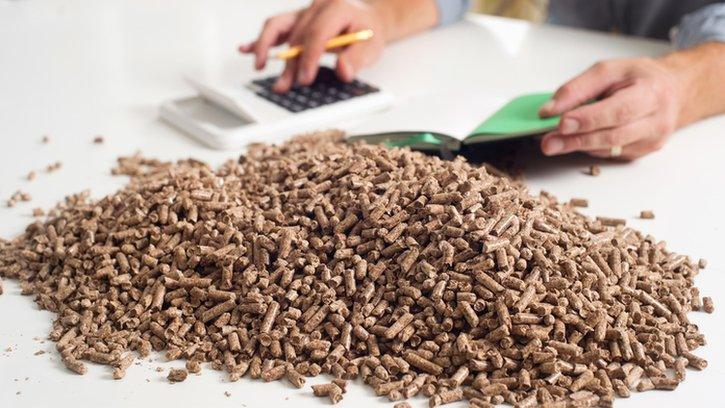Timeline: Renewable Heat Incentive scandal
- Published
The Renewable heat Incentive (RHI) scheme was an energy initiative set up to encourage businesses in Northern Ireland to switch from fossil fuels to renewable sources.
But major flaws in its set-up and implementation meant the scheme risked going vastly over budget, with fears that the overspend could reach as much as £700m over 20 years.
The scheme was shut in 2016 and deep cuts in subsidies introduced in 2017 and 2019 brought it within budget.
A top civil servant has since told MPs that the overspend figure had actually been just over £33m before the measures to curb spending were introduced.
BBC News NI outlines the history of the scheme and how it led to the collapse of devolution in Northern Ireland.

November 2012

Tariffs for the scheme were set by the Department for the Environment
The RHI is launched in Northern Ireland, external to help businesses, public sector, and other non-domestic organisations in Northern Ireland meet the cost of installing renewable heat technologies - therefore reducing the UK's carbon emissions.
Tariffs are set by Stormont's Department of Enterprise, Trade and Investment (DETI).
Eligible applicants are entitled to help for 20 years after accreditation.

2013
A whistleblower contacts DETI Minister Arlene Foster alleging abuse of the scheme.
A follow-up email is sent on 12 May 2014.

Late 2014
The initiative is extended to the domestic sector.

January 2015
DETI is due to seek re-approval of the scheme from the Department of Finance but this is overlooked due to a "combination of staff changes and an administrative oversight".
Applications for the initiative increase.

February 2016
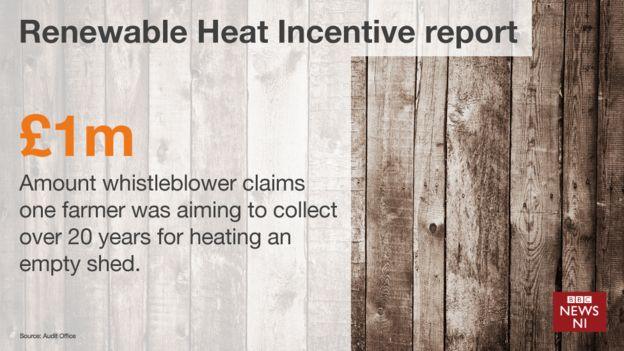
Whistleblowers allege RHI has overspent by millions.
Industry Minister Jonathan Bell announces his intention to close the scheme to new applications.
An investigation into the scheme gets underway.

July 2016
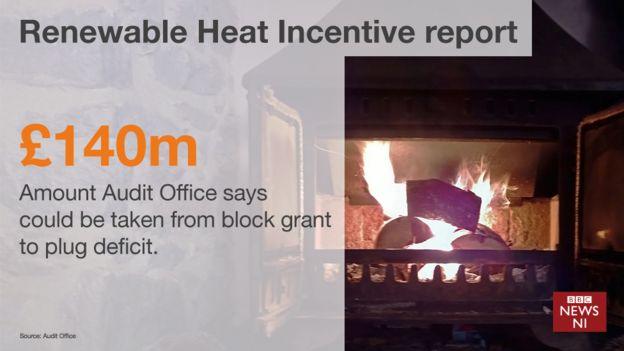
The Audit Office says "serious systemic failings" would hit the Northern Ireland budget to the tune of hundreds of millions of pounds.
There was no cap on the subsidy payments: the more heat you generated, the greater the subsidy you were paid.
Economy Minister Simon Hamilton (DUP) says the ongoing costs of the scheme to taxpayers are "incredible".

October 2016
Senior members of Ofgem E-Serve appear before the assembly's Public Accounts Committee.
They reveal there were no minutes taken of formal meetings between themselves and departmental officials between August 2014 and November the following year.

8 December 2016
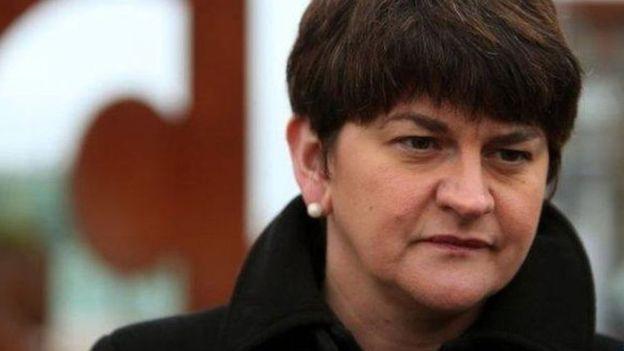
Arlene Foster was the minister in charge of the Department at the time RHI was set up
A whistleblower tells the BBC's Nolan Show that "five minutes" of research was needed to discover serious flaws in the RHI.
She says she contacted Arlene Foster in 2013 to warn the then enterprise minister about the issue.
SDLP leader Colum Eastwood calls on Mrs Foster to appear before the Public Accounts Committee.

12 December 2016
Mrs Foster says she has "nothing to hide" in relation to the RHI.
She announces that the executive will write to claimants to seek permission for their names to be made public in a bid to restore public confidence.
Political opponents accuse Mrs Foster of shirking responsibility on the issue.
14 December 2016
Senior sources tell the BBC Arlene Foster personally fought a decision by an executive colleague to close the scheme.
Stormont's first and deputy first ministers ask for the Northern Ireland Assembly to be recalled to discuss the botched heat scheme.

15 December 2016
Jonathan Bell claims that senior DUP aides tried to remove Arlene Foster's name from documents
In an exclusive interview with the BBC's Stephen Nolan, former DUP minister Jonathan Bell says advisers to Arlene Foster attempted to remove her name from documents linked to RHI.
Mr Bell, who succeeded Mrs Foster as the minister of the department that set up the scheme, claims two top DUP advisers "were not allowing this scheme to be closed" at the point when costs were spiralling out of control in autumn 2015.
Mrs Foster responds that if papers were altered "it wasn't on my say-so".
The two advisers named by Mr Bell, Timothy Johnston and Dr Andrew Crawford, said they never sought to keep the RHI scheme open against the wishes of the minister, adding that their roles were simply "to offer advice" and not to "influence any decision".
21 December 2016
The executive is reported to be considering complete closure of the RHI scheme. Buying out the recipients would incur a cost, but would reduce the final bill.
4 January 2017
Arlene Foster again says she will not stand down over the RHI scandal, adding that some calls for her to do so are "misogynistic".
Biomass boiler owners say they have formed a group to deal directly with government officials proposing changes to the scheme.
Economy Minister Simon Hamilton is reported to be seeking Sinn Féin's approval for emergency legislation, which he says could reduce the projected £490m overspend to "zero".
The DUP says the plan could be brought to the assembly next week if agreed by the executive.
Sinn Féin Finance Minister Máirtín Ó Muilleoir says he is "bemused " by the DUP trailing the proposal in the media before speaking to him.
5 January 2017
Former DUP MLA David McIlveen criticises Mrs Foster for what he describes as the RHI "omnishambles". He says she has "seriously misjudged" public anger.
Sinn Féin leader Gerry Adams says the political institutions have reached "a defining point" over the first minister's refusal to step aside.
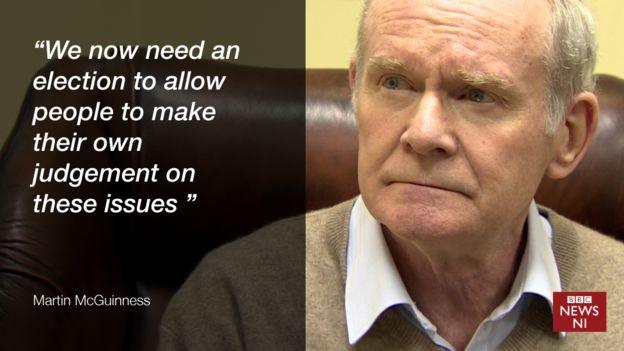
9 January 2017
Martin McGuinness resigns as deputy first minister in protest at the DUP's handling of the RHI scandal.
Outgoing First Minister Arlene Foster denounces Sinn Féin's actions as "political, not principled".

10 January 2017
The situation made an assembly election look "highly likely", says then Northern Ireland Secretary James Brokenshire, calling talks with all parties to find a resolution to the crisis.
11 January 2017
Sinn Féin says it will not enter negotiations ahead of new assembly elections.
Prime Minister Theresa May says the government is putting in "every effort" to ensure a solution is reached, adding that Northern Ireland's voice would continue to be heard in Brexit negotiations.
13 January 2017
RHI inspectors say they have suspended payments at more than half the boilers they have audited. OFGEM said of the 63 inspected, payments were suspended at 33. Five have since had payments reinstated after investigations.
16 January 2017
An assembly election is called after Sinn Fein refuse to nominate a deputy first minister to succeed Martin McGuinness.
19 January 2017
A former adviser to Arlene Foster resigns after claims he exerted influence over the flawed energy scheme.
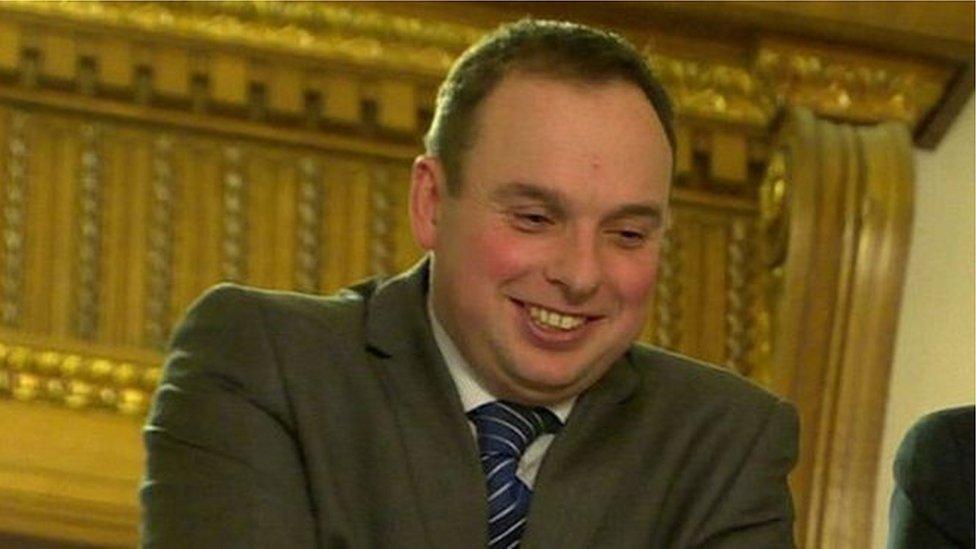
Andrew Crawford denies the claims against him
21 January 2017
DUP MLA Jim Wells reveals that four members of his family installed wood pellet boilers under the RHI scheme.
23 January 2017
MLAs pass regulations to cut the cost of the RHI scheme by lowering the tariff paid to claimants. The regulations are expected to save £30m in the 2017/18 budget - and will apply for 12 months.
24 January 2017
A judge issues an interim injunction preventing the publication of hundreds of names of Renewable Heat Incentive (RHI) claimants.
Finance Minister Máirtín Ó Muilleoir announces a public inquiry into the RHI scandal, to be chaired by retired appeal court judge Sir Patrick Coghlin.
1 March 2017
A judge rules that corporate companies receiving RHI subsidies can be named. The Department of the Economy says it will publish information "as soon as is practical".
16 March 2017
A list of companies receiving a subsidy under the RHI scheme is released by the Department of the Economy. The list covers about half of all those who receive payments and is limited to companies rather than individuals.
6 April 2017
A group that represents hundreds of Renewable Heat Incentive (RHI) boiler owners says some of its members are folding because of cuts in payments. New tariff rates that have a substantially reduced subsidy took affect on 1 April and the Renewable Heath Association (RHANI) said several firms were shutting down.
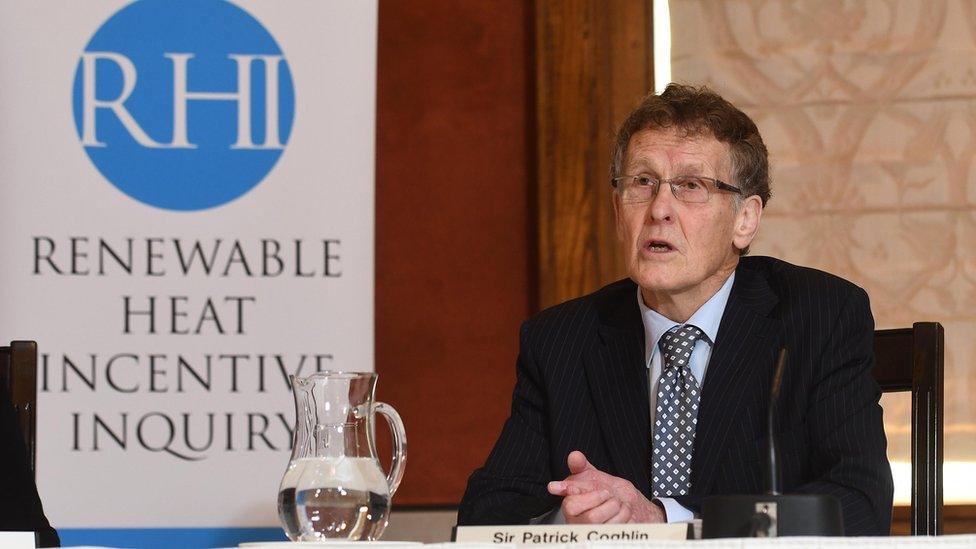
27 April 2017
The preliminary hearing of the RHI inquiry takes place at Stormont. Sir Patrick Coghlin, the inquiry's chair, said public evidence hearings should begin in the autumn.

8 May 2017
There is a setback in a plan to inspect all 2,100 boilers in the scheme as the Department for the Economy has been unable to appoint a company to carry out the work.

24 May 2017
The department publishes a full list of companies that have received subsidy payments under the RHI scheme. It includes 821 claimants who shared a total of £62m between 2012 and February 2017.

30 June 2017
A plan to inspect all the boiler installations on the scheme in order to establish how they are being used is shelved.

16 August 2017
The Department for the Economy says it intends to seek a 12-months extension of its rules the cut the scheme's cost, originally implemented for one year from April.

8 September 2017
A major pig farming business in Cloughmills in County Antrim says it is taking the Department for the Economy to court over plans for a power plant linked to the RHI scheme.
18 September 2017
It is announced that the public inquiry into the RHI scheme has been delayed, and Arlene Foster has been given special rights at the inquiry, allowing her to access witness statements.
October 2017
A legal challenge by RHI scheme claimants against a decision by the Department for the Economy to reduce tariff payments begins in Belfast.
Officials who ran the initiative showed "crass incompetence", a barrister for the claimants says
The court hears that a civil service calculation of the projected scheme overspend was "flawed"
A barrister for the department tells the court that the scheme was never meant to subsidise Northern Ireland's poultry or mushroom industries
Some claimants on the scheme were "overcompensated" and were able to repay boiler installation costs within a year, the department's barrister says
The court hears that the Northern Ireland Assembly does have the power to introduce big cuts to the scheme's tariffs.
Judgement in the case is reserved.

7 November 2017
The public inquiry into the RHI scheme, chaired by Sir Patrick Coghlin, begins its oral evidence hearings at Stormont's Parliament Buildings.
- Published12 December 2016
